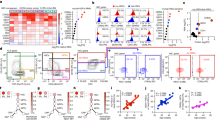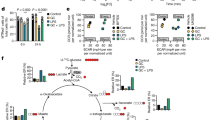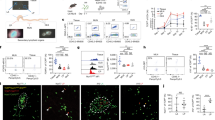Abstract
Leukotriene B4 (LTB4) synthesis is enhanced in the colonic mucosa in patients with inflammatory bowel disease (IBD). BLT1, a high-affinity receptor for LTB4, exhibits no effect on the progression of dextran sodium sulfate (DSS)-induced colitis, which mostly relies on innate immunity. Here, we reported that BLT1 regulates trinitrobenzene sulfonic acid (TNBS)-induced colitis, which reflects CD4+ T-cell-dependent adaptive immune mechanisms of IBD. We found that BLT1 signaling enhanced the progression of colitis through controlling the production of proinflammatory cytokines by dendritic cells (DCs) and modulating the differentiation of Th1 and Th17. BLT1−/− mice displayed an alleviated severity of TNBS-induced colitis with reduced body weight loss and infiltrating cells in the lamina propria. BLT1 deficiency in DCs led to reduced production of proinflammatory cytokines, including IL-6, TNF-α, and IL-12, and these results were further confirmed via treatment with a BLT1 antagonist. The impaired cytokine production by BLT1−/− DCs subsequently led to reduced Th1 and Th17 differentiation both in vitro and in vivo. We further performed a conditional DC reconstitution experiment to assess whether BLT1 in DCs plays a major role in regulating the pathogenesis of TNBS-induced colitis, and the results indicate that BLT1 deficiency in DCs also significantly reduces disease severity. The mechanistic study demonstrated that BLT1-regulated proinflammatory cytokine production through the Gαi βγ subunit-phospholipase Cβ (PLCβ)-PKC pathway. Notably, we found that treatment with the BLT1 antagonist also reduced the production of proinflammatory cytokines by human peripheral blood DCs. Our findings reveal the critical role of BLT1 in regulating adaptive immunity and TNBS-induced colitis, which further supports BLT1 as a potential drug target for adaptive immunity-mediated IBD.
This is a preview of subscription content, access via your institution
Access options
Subscribe to this journal
Receive 12 digital issues and online access to articles
$119.00 per year
only $9.92 per issue
Buy this article
- Purchase on Springer Link
- Instant access to full article PDF
Prices may be subject to local taxes which are calculated during checkout






Similar content being viewed by others
References
Capra, V., Ambrosio, M., Riccioni, G. & Rovati, G. E. Cysteinyl-leukotriene receptor antagonists: present situation and future opportunities. Curr. Med. Chem. 13, 3213–3226 (2006).
Shimizu, T., Radmark, O. & Samuelsson, B. Enzyme with dual lipoxygenase activities catalyzes leukotriene A4 synthesis from arachidonic acid. Proc. Natl Acad. Sci. USA 81, 689–693 (1984).
Lam, B. K., Penrose, J. F., Freeman, G. J. & Austen, K. F. Expression cloning of a cDNA for human leukotriene C4 synthase, an integral membrane protein conjugating reduced glutathione to leukotriene A4. Proc. Natl Acad. Sci. USA 91, 7663–7667 (1994).
Zhang, S. Z., Zhao, X. H. & Zhang, D. C. Cellular and molecular immunopathogenesis of ulcerative colitis. Cell. Mol. Immunol. 3, 35–40 (2006).
Elson, C. O., Sartor, R. B., Tennyson, G. S. & Riddell, R. H. Experimental models of inflammatory bowel disease. Gastroenterology 109, 1344–1367 (1995).
Jurjus, A. R., Khoury, N. N. & Reimund, J. M. Animal models of inflammatory bowel disease. J. Pharmacol. Toxicol. Methods 50, 81–92 (2004).
Wirtz, S. et al. Chemically induced mouse models of acute and chronic intestinal inflammation. Nat. Protoc. 12, 1295–1309 (2017).
Baumgart, D. C. & Carding, S. R. Inflammatory bowel disease: cause and immunobiology. Lancet 369, 1627–1640 (2007).
Zhang, Z. et al. TAOK1 negatively regulates IL-17-mediated signaling and inflammation. Cell. Mol. Immunol. 2018.
McKinstry, K. K., Strutt, T. M. & Swain, S. L. Regulation of CD4+T-cell contraction during pathogen challenge. Immunol. Rev. 236, 110–124 (2010).
Zhu, J. & Paul, W. E. Heterogeneity and plasticity of T helper cells. Cell Res. 20, 4–12 (2010).
Zhu, J., Yamane, H. & Paul, W. E. Differentiation of effector CD4 T cell populations (*). Annu. Rev. Immunol. 28, 445–489 (2010).
Lai, W. et al. Deficiency of the G protein Galphaq ameliorates experimental autoimmune encephalomyelitis with impaired DC-derived IL-6 production and Th17 differentiation. Cell. Mol. Immunol. 14, 557–567 (2017).
Hue, S. et al. Interleukin-23 drives innate and T cell-mediated intestinal inflammation. J. Exp. Med. 203, 2473–2483 (2006).
Becker, C. et al. Constitutive p40 promoter activation and IL-23 production in the terminal ileum mediated by dendritic cells. J. Clin. Investig. 112, 693–706 (2003).
Song, X., He, X., Li, X. & Qian, Y. The roles and functional mechanisms of interleukin-17 family cytokines in mucosal immunity. Cell. Mol. Immunol. 13, 418–431 (2016).
Sharon, P. & Stenson, W. F. Enhanced synthesis of leukotriene B4 by colonic mucosa in inflammatory bowel disease. Gastroenterology 86, 453–460 (1984).
Cuzzocrea, S. et al. 5-Lipoxygenase modulates colitis through the regulation of adhesion molecule expression and neutrophil migration. Lab. Investig. 85, 808–822 (2005).
Holma, R. et al. Acute effects of the cys-leukotriene-1 receptor antagonist, montelukast, on experimental colitis in rats. Eur. J. Pharmacol. 429, 309–318 (2001).
Iizuka, Y. et al. Protective role of the leukotriene B4 receptor BLT2 in murine inflammatory colitis. FASEB J. 24, 4678–4690 (2010).
Pull, S. L., Doherty, J. M., Mills, J. C., Gordon, J. I. & Stappenbeck, T. S. Activated macrophages are an adaptive element of the colonic epithelial progenitor niche necessary for regenerative responses to injury. Proc. Natl Acad. Sci. USA 102, 99–104 (2005).
Dieleman, L. A. et al. Dextran sulfate sodium-induced colitis occurs in severe combined immunodeficient mice. Gastroenterology 107, 1643–1652 (1994).
Krieglstein, C. F. et al. Collagen-binding integrin alpha1beta1 regulates intestinal inflammation in experimental colitis. J. Clin. Investig. 110, 1773–1782 (2002).
Liu, J. et al. Rhbdd3 controls autoimmunity by suppressing the production of IL-6 by dendritic cells via K27-linked ubiquitination of the regulator NEMO. Nat. Immunol. 15, 612–622 (2014).
Li, C. et al. Berberine ameliorates TNBS induced colitis by inhibiting inflammatory responses and Th1/Th17 differentiation. Mol. Immunol. 67(2 Pt B), 444–454 (2015).
Mikami, Y. et al. Competition between colitogenic Th1 and Th17 cells contributes to the amelioration of colitis. Eur. J. Immunol. 40, 2409–2422 (2010).
Brand, S. Crohn’s disease: Th1, Th17 or both? The change of a paradigm: new immunological and genetic insights implicate Th17 cells in the pathogenesis of Crohn’s disease. Gut 58, 1152–1167 (2009).
Blanco, P., Palucka, A. K., Pascual, V. & Banchereau, J. Dendritic cells and cytokines in human inflammatory and autoimmune diseases. Cytokine Growth Factor Rev. 19, 41–52 (2008).
Wang, L. et al. Antiasthmatic drugs targeting the cysteinyl leukotriene receptor 1 alleviate central nervous system inflammatory cell infiltration and pathogenesis of experimental autoimmune encephalomyelitis. J. Immunol. 187, 2336–2345 (2011).
Guermonprez, P., Valladeau, J., Zitvogel, L., Thery, C. & Amigorena, S. Antigen presentation and T cell stimulation by dendritic cells. Annu. Rev. Immunol. 20, 621–667 (2002).
Kapsenberg, M. L. Dendritic-cell control of pathogen-driven T-cell polarization. Nat. Rev. Immunol. 3, 984–993 (2003).
Schmitt, N. & Ueno, H. Regulation of human helper T cell subset differentiation by cytokines. Curr. Opin. Immunol. 34, 130–136 (2015).
Manel, N., Unutmaz, D. & Littman, D. R. The differentiation of human T(H)-17 cells requires transforming growth factor-beta and induction of the nuclear receptor RORgammat. Nat. Immunol. 9, 641–649 (2008).
Drakes, M. L., Blanchard, T. G. & Czinn, S. J. Colon lamina propria dendritic cells induce a proinflammatory cytokine response in lamina propria T cells in the SCID mouse model of colitis. J. Leukoc. Biol. 78, 1291–1300 (2005).
Yokomizo, T. Two distinct leukotriene B4 receptors, BLT1 and BLT2. J. Biochem. 157, 65–71 (2015).
Spite, M. et al. Deficiency of the leukotriene B4 receptor, BLT-1, protects against systemic insulin resistance in diet-induced obesity. J. Immunol. 187, 1942–1949 (2011).
de Hoog, V. C. et al. BLT1 antagonist LSN2792613 reduces infarct size in a mouse model of myocardial ischaemia-reperfusion injury. Cardiovasc. Res. 108, 367–376 (2015).
Kihara, Y. et al. The leukotriene B4 receptor, BLT1, is required for the induction of experimental autoimmune encephalomyelitis. Biochem. Biophys. Res. Commun. 394, 673–678 (2010).
Del Prete, A. et al. Regulation of dendritic cell migration and adaptive immune response by leukotriene B4 receptors: a role for LTB4 in up-regulation of CCR7 expression and function. Blood 109, 626–631 (2007).
Tager, A. M. et al. Leukotriene B4 receptor BLT1 mediates early effector T cell recruitment. Nat. Immunol. 4, 982–990 (2003).
Miyahara, N. et al. Requirement for leukotriene B4 receptor 1 in allergen-induced airway hyperresponsiveness. Am. J. Respir. Crit. Care Med. 172, 161–167 (2005).
Sawada, Y. et al. Resolvin E1 inhibits dendritic cell migration in the skin and attenuates contact hypersensitivity responses. J. Exp. Med. 212, 1921–1930 (2015).
Toda, A. et al. Attenuated Th1 induction by dendritic cells from mice deficient in the leukotriene B4 receptor 1. Biochimie 92, 682–691 (2010).
Tavares, N. M. et al. Understanding the mechanisms controlling Leishmania amazonensis infection in vitro: the role of LTB4 derived from human neutrophils. J. Infect. Dis. 210, 656–666 (2014).
Sanchez-Galan, E. et al. Leukotriene B4 enhances the activity of nuclear factor-kappaB pathway through BLT1 and BLT2 receptors in atherosclerosis. Cardiovasc. Res. 81, 216–225 (2009).
Zhu, J., Zhang, Y., Shen, Y., Zhou, H. & Yu, X. Lycium barbarum polysaccharides induce Toll-like receptor 2- and 4-mediated phenotypic and functional maturation of murine dendritic cells via activation of NF-kappaB. Mol. Med. Rep. 8, 1216–1220 (2013).
Lim, S. M., Jeong, J. J., Choi, H. S., Chang, H. B. & Kim, D. H. Mangiferin corrects the imbalance of Th17/Treg cells in mice with TNBS-induced colitis. Int. Immunopharmacol. 34, 220–228 (2016).
Jin, Y., Lin, Y., Lin, L. & Zheng, C. IL-17/IFN-gamma interactions regulate intestinal inflammation in TNBS-induced acute colitis. J. Interferon Cytokine Res. 32, 548–556 (2012).
Ito, N. et al. Requirement of phosphatidylinositol 3-kinase activation and calcium influx for leukotriene B4-induced enzyme release. J. Biol. Chem. 277, 44898–44904 (2002).
Sabirsh, A., Bristulf, J. & Owman, C. Exploring the pharmacology of the leukotriene B4 receptor BLT1, without the confounding effects of BLT2. Eur. J. Pharmacol. 499, 53–65 (2004).
Acknowledgements
This work was supported by grants from the Ministry of Science and Technology of China (2014CB541903), the National Natural Science Foundation of China (31171348 and 31371414), and the Fundamental Research Funds for the Central Universities.
Author information
Authors and Affiliations
Corresponding authors
Ethics declarations
Competing interests
The authors declare no competing interests.
Electronic supplementary material
Rights and permissions
About this article
Cite this article
Zhou, J., Lai, W., Yang, W. et al. BLT1 in dendritic cells promotes Th1/Th17 differentiation and its deficiency ameliorates TNBS-induced colitis. Cell Mol Immunol 15, 1047–1056 (2018). https://doi.org/10.1038/s41423-018-0030-2
Received:
Revised:
Accepted:
Published:
Issue Date:
DOI: https://doi.org/10.1038/s41423-018-0030-2
Keywords
This article is cited by
-
CXCR1 drives the pathogenesis of EAE and ARDS via boosting dendritic cells-dependent inflammation
Cell Death & Disease (2023)
-
Neutrophil extracellular trap induction through peptidylarginine deiminase 4 activity is involved in 2,4,6-trinitrobenzenesulfonic acid-induced colitis
Naunyn-Schmiedeberg's Archives of Pharmacology (2023)
-
Effects of experimental ulcerative colitis on myenteric neurons in P2X7-knockout mice
Histochemistry and Cell Biology (2023)
-
Critical roles of G protein-coupled receptors in regulating intestinal homeostasis and inflammatory bowel disease
Mucosal Immunology (2022)
-
Expression of leukotriene B4 receptor 1 defines functionally distinct DCs that control allergic skin inflammation
Cellular & Molecular Immunology (2021)



